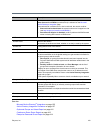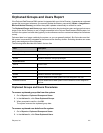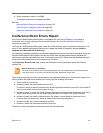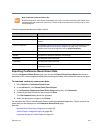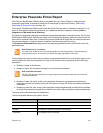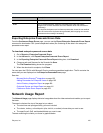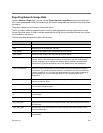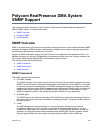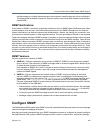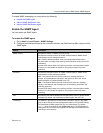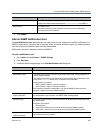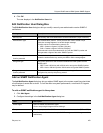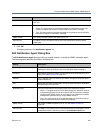
Polycom RealPresence DMA System SNMP Support
Polycom, Inc. 421
To enable SNMP messaging you must perform the following:
● Enable the SNMP Agent
● Add an SNMP Notification User
● Add an SNMP Notification Agent
Enable the SNMP Agent
You can enable the SNMP Agent.
To enable the SNMP agent
1 Go to Admin > Local Cluster > SNMP Settings.
2 Configure the following settings for the connection between the RealPresence DMA system and the
SNMP agent.
Setting Description
SNMP Version Specifies the version of SNMP you want to use.
Specifies the transport protocol for SNMP communications. SNMP can be
implemented over two transport protocol:
v2c—Used for standard models. Uses community-based authentication.
v3—Used when you want a high security model. Requires a security user for
notifications.
Because UDP doesn't have error recovery services, it requires fewer network
resources. It is well suited for repetitive, low-priority functions like alarm
monitoring.
Transport Specifies the transport protocol for SNMP communications. SNMP can be
implemented over two transport protocols:
TCP—This protocol has error-recovery services, message delivery is
assured, and messages are delivered in the order they were sent. Some
SNMP managers only support SNMP over TCP.
UDP—This protocol does not provide error-recovery services, message
delivery is not assured, and messages are not necessarily delivered in the
order they were sent.
Because UDP doesn't have error recovery services, it requires fewer network
resources. It is well suited for repetitive, low-priority functions like alarm
monitoring.
Port Specifies the port that the RealPresence DMA system uses for general SNMP
messages. By default, the RealPresence DMA system uses port 161.
Community For SNMPv2c, specifies the context for the information, which is the SNMP
group to which the devices and management stations running SNMP belong.
The RealPresence DMA system has only one valid context—by default,
public—which is identified by this Community name. The RealPresence
DMA system will not respond to requests from management systems that do
not belong to its community.



